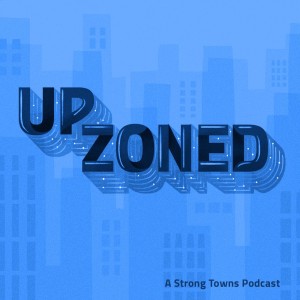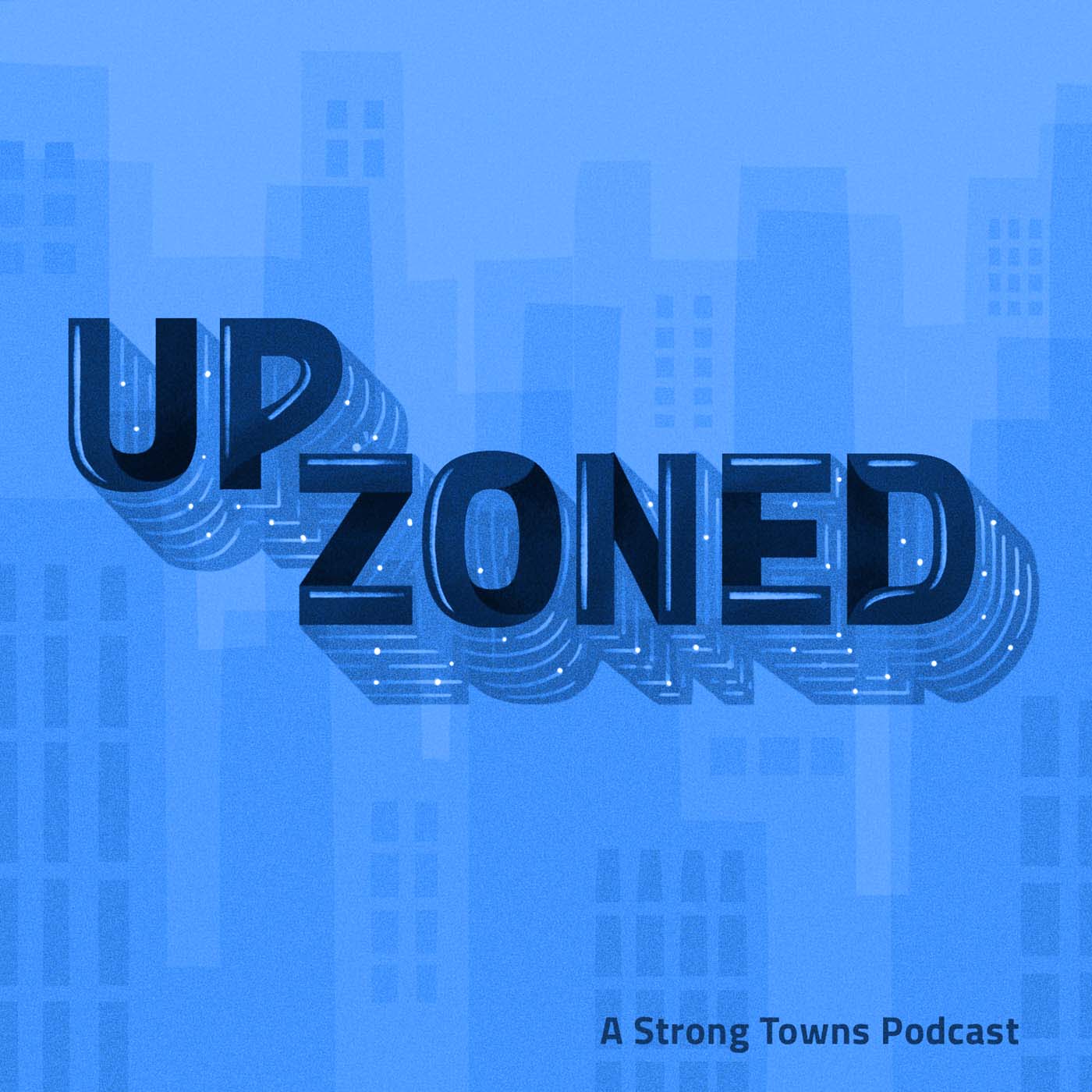Episodes

Wednesday Apr 12, 2023
One Reason American Architecture Is Considered Boring: Stairs
Wednesday Apr 12, 2023
Wednesday Apr 12, 2023
Have you ever wondered why multifamily housing has the same, copied look in most places? Part of the reason is due to the way regulations require architects to build stairs. On this Upzoned podcast, host Abby Kinney talks with special guest and architect Kevin Klinkenberg about how building codes and zoning laws can be helpful, yet at the same time limit building possibilities.
ADDITIONAL SHOW NOTES
-
“Why Does American Multifamily Architecture Look so Banal? Here’s One Reason,” by Michael Eliason, The Architect’s Newspaper (March 2023).

Wednesday Apr 05, 2023
Cowboy Hotels for Housing Shortages
Wednesday Apr 05, 2023
Wednesday Apr 05, 2023
Like all major cities in America, Seattle is facing a housing shortage. And 100 years ago, Seattle faced a housing shortage bigger than the one it has now. The initial response to the historic shortage was to build small, boxy, apartment buildings holding four to six apartments (called Cowboy Hotels) that blended in with the houses already established in the neighborhood. In this Upzoned episode, host Abby Kinney and co-host Chuck Marohn talk about Cowboy Hotels and their financial possibilities.
ADDITIONAL SHOW NOTES
-
“Small Apartments From 100 Years ago Offer Townhome Alternative,” by Joshua McNichols, KUOW, (March 2023).

Wednesday Mar 29, 2023
Homelessness in Rural America
Wednesday Mar 29, 2023
Wednesday Mar 29, 2023
Homelessness in rural areas can look different than in bigger cities: as noted in a recent article by The Daily Yonder, rural homelessness is more “hidden,” and is expressed through couch surfing, roommate arrangements, and housing insecurity versus seeing people without homes on the street.
What can we do to address the housing crisis in rural communities? Join host Abby Kinney and co-host Chuck Marohn on the Upzoned podcast as they talk about this growing problem and possible solutions.
ADDITIONAL SHOW NOTES
-
“Tackling Rural America’s ‘Hidden’ Housing Crisis,” by Taylor Sisk and Jan Pytalski, The Daily Yonder (March 2023).

Wednesday Mar 22, 2023
High-Income Earners Are Renting Instead of Buying Homes
Wednesday Mar 22, 2023
Wednesday Mar 22, 2023
High-earning Americans are renting instead of buying homes. Some even say they plan to rent indefinitely. Why is that? In this week’s Upzoned episode, join host Abby Kinney and guest Norm Van Eeden Petersman as they talk about this trend.
ADDITIONAL SHOW NOTES
-
“Three Million U.S. Households Making Over $150,000 Are Still Renters,” by Will Parker, The Wall Street Journal (March 2023).

Wednesday Mar 15, 2023
When a Building Is Demolished, What Should Happen to the Materials?
Wednesday Mar 15, 2023
Wednesday Mar 15, 2023
“What happens when old buildings have reached the end of their life, either their useful life in terms of safety or their desirable life in terms of modern living?” a Next City article asks. The piece goes on to say that when buildings throughout the U.S. get demolished, the once useful construction materials often end up in landfills. But there’s a growing movement to try and disassemble buildings carefully, and rescue building materials to be used in other projects. In today’s Upzoned episode, host Abby Kinney and co-host Chuck Marohn talk about this growing movement.
ADDITIONAL SHOW NOTES
-
“How A Deconstruction Company And Salvage Shop Are Keeping Building Materials Out Of Landfills,” by Cinnamon Janzer, Next City (March, 2023).

Wednesday Mar 08, 2023
The 15 Minute City - A Good Life or an Infringement on Freedoms?
Wednesday Mar 08, 2023
Wednesday Mar 08, 2023
The 15 Minute City: a term to describe mixed use neighborhoods, has become a political concept where critics believe the idea could result in an infringement on personal freedoms.
On this Upzoned podcast, host Abby Kinney and special guest Kevin Klinkenberg, talk about this contentious topic of the 15 Minute City and answer the question: Are the concerns people have (about 15 minute cities) warranted, or is this something that we should all be rolling our eyes at and moving on from?
ADDITIONAL SHOW NOTES
“The 15 Minute City - Where Urban Planning Meets Conspiracy Theories,” by Chris Standford, The New York Times (March, 2023)
“The Messy City Podcast” by Kevin Klinkenberg.
Abby Kinney (Twitter)
Kevin Klinkenberg (Twitter)
Theme Music by Kemet the Phantom

Wednesday Mar 01, 2023
Wednesday Mar 01, 2023
It’s important to build safe and productive streets, but how do we ensure those streets are a place people want to be and live in? Whose responsibility is it to ensure that buildings interact with the public realm in a delightful way? Design is hugely impactful in our daily lives: it can determine if a place is somewhere for people, or if it’s unlivable and unusable. And design isn’t wholly up to the “eye of the beholder.” It’s possible to quantify beauty.
Today on the Upzoned podcast, join host Abby Kinney as she welcomes a special guest: Tristan Cleveland, Strong Towns member, urban planner at Happy City, and PhD candidate with Healthy Populations Institute. In this episode, Abby and Cleveland talk about his recent Planetizen article, “The Responsibility of the Building to the Street.”
ADDITIONAL SHOW NOTES
-
“The Responsibility of the Building to the Street,” by Tristan Cleveland, Planetizen (February 2023).

Wednesday Feb 15, 2023
We’re Getting Worse at Construction Despite Technology Advances
Wednesday Feb 15, 2023
Wednesday Feb 15, 2023
Despite global advantages and new technologies, we are getting worse at construction. At least, that’s the case that Ezra Klein makes in his New York Times article, “The Story Construction Tells About America’s Economy Is Disturbing.”
Today on Upzoned, join host Abby Kinney and co-host Chuck Marohn as they talk about this idea and add on to the conversation with an explanation on the difference between “complicated” and “complex.”
ADDITIONAL SHOW NOTES
-
“The Story Construction Tells About America’s Economy Is Disturbing,” by Ezra Klein, The New York Times (February 2023).

Wednesday Feb 01, 2023
Portland’s Cully Neighborhood To Use “The One Ring” for Good
Wednesday Feb 01, 2023
Wednesday Feb 01, 2023
Portland’s Cully neighborhood is about to embark on a big urban renewal experiment with the intention of maintaining that area's current affordability. Yes, you heard that right.
In the past, the term “urban renewal” was mainly associated with mid-20th century schemes that displaced residents by seizing and demolishing large swaths of neighborhoods in order to modernize them with highways, roads, and other infrastructure elements.
Now, Cully hopes to use similar tools for the better. Under what the city has labeled an “urban renewal” plan, it would borrow against future tax revenues to invest in programs and purchases that are intended to stabilize residents and businesses (versus tearing them down for pavement projects).
In this Upzoned episode, host Abby Kinney and co-host Chuck Marohn talk about the reality of a top-down plan like this and how it can be dangerous for communities to think this way, even if they only intend to do good.
ADDITIONAL SHOW NOTES
-
“NE Portland’s Cully neighborhood fights displacement, climate change with urban renewal. But will it work?” by Gosia Wozniacka, The Orgonian (January 2023).

Wednesday Jan 25, 2023
The Governor of Missouri Wants to Spend $859 Million on Highway Expansion
Wednesday Jan 25, 2023
Wednesday Jan 25, 2023
The state of Missouri has a $6 billion budget surplus due to an increase in tax revenue and unspent federal aid. Governor Parson wants to use $859 million of it to expand I-70, the major transport route which connects Kansas City and St. Louis. This expansion would bulldoze through key areas in downtown St. Louis, areas west of downtown, and even the suburban areas of Columbia (which sits right near the middle of the interstate). Lots of people, even those unfamiliar with the Strong Towns perspective, think this expenditure proposal is a bad idea.
Today, join host Abby Kinney and co-host Chuck Marohn on the Upzoned podcast as they discuss this story and potential avenues for better spending.
ADDITIONAL SHOW NOTES
-
“Missouri Gov. Parson Wants $859M to Expand I-70. Here Are His Other Budget Priorities,” by Kacen Bayless and Jonathan Shorman, The Kansas City Star (January 2023).

